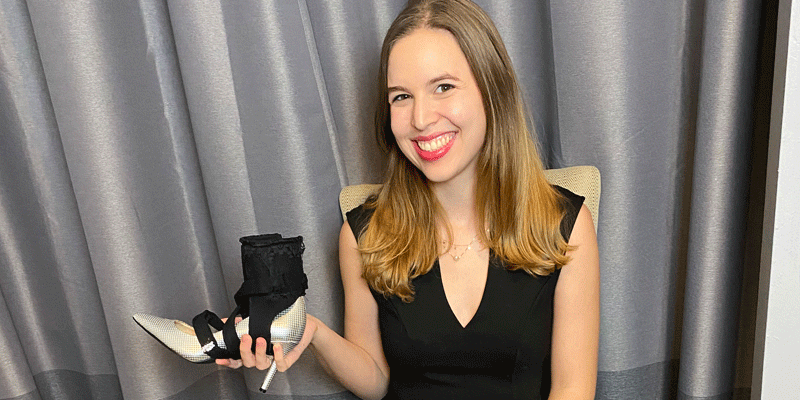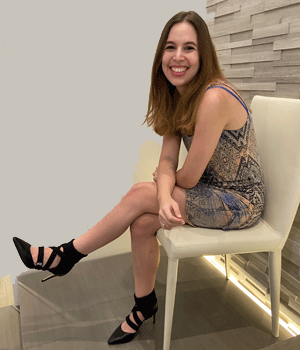Leia Serlin, ’21, Puts a Better Foot Forward for Honors Thesis
January 8, 2021
By Jake Weber

Leia Serlin, ’21, with the high heel stabilizing device she designed and built as her Honors thesis. Serlin, from West Bloomfield, Mich., is majoring in biology and is a member of the Prentiss M. Brown Honors Program and the Lisa and James Wilson Institute for Medicine.
Finding a pair of shoes that’s both comfortable and stylish is a universal—and universally frustrating—activity, even for people without foot or ankle problems. If you’re a twentysomething with joint issues, you might just resign yourself to a life lived in ballet flats. Or you might be Leia Serlin, ’21, who channeled her frustration into an academic—and personal—triumph.
“There’s just nothing fashion-forward for people with arthritis,” says Serlin, who suffers from an arthritis-type autoimmune disorder that makes it impossible for her to simply slip into many types of shoes. “I couldn’t find a device that would allow me to wear high heels. I started thinking about how I could make something myself and my adviser (Wilson Institute Director Dr. Brad Rabquer) said maybe this could be an Honors thesis.”
This past semester, Serlin has designed and built three different size prototypes of her device, which provides ankle support, holds the shoe in position under the foot, and—most importantly—doesn’t look “orthopedic,” including lacing, rhinestones and other decorative elements. In the midst of a pandemic and the challenge of social distancing, Serlin also managed to work with some two dozen project volunteers, with and without arthritis, who walk-tested the devices.

Serlin wearing a pair of heels with her stabilizing device.
After weeks spent researching joint stability issues and treatments (supported by Albion’s Foundation for Research, Scholarship, and Creative Activity), Serlin had a straightforward goal—and a difficult challenge. Her previous sewing experience, making a pillow and quilting with her grandmother, didn’t go very far toward creating a fittable device out of materials that can’t all be run under a sewing machine. “I did a lot of picking things apart to resew them,” she says, adding that many of her materials came from dissecting ankle wraps, ankle braces and brassieres. “I’ve really gotten a lot better at sewing from doing this.”
Another challenge was working with her test subjects in the middle of a pandemic. “I’m in a higher-risk group for COVID, so I also had to wear two masks and a face shield,” she recalls. “I have to use so much disinfectant that I made my own sanitizer with alcohol and vanilla, because I spray it on everything.”
And if that wasn’t enough, “I had a flare-up of my disease and I had to have IV medication,” Serlin says. “Some of the time I was trying to help people put on the devices while I was wearing a mask and gloves and I had an IV on the back of my hand. It was interesting …. And sometimes uncomfortable, but I’m very internally motivated. If I want something I find a way to get it done.”
Serlin’s fall work and testing yielded a lot of constructive comments and positive feedback. “Some of the testers without arthritis said they liked the additional stability, and people who have arthritis thought it was amazing,” she says.
The feedback was so positive that Serlin is thinking about how she might make her device available to others, although she’s not sure she wants to head down that unexpected path. “I’m still planning to apply to dentistry school, because I’m interested in helping people,” she reflects. “I never thought about creating something new that would help people. It never occurred to me that I would be the one doing this.”